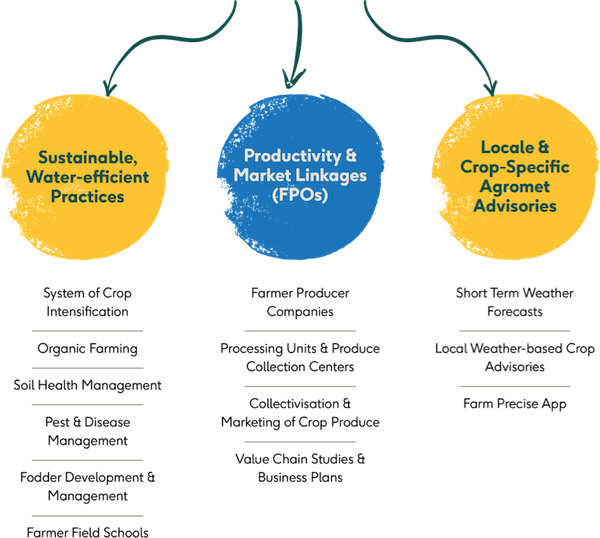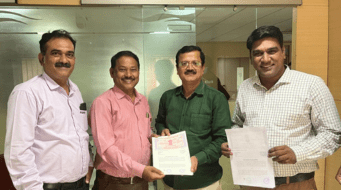
-Karan Misquitta
Mobile telecommunications are increasingly being used to deliver weather forecasts directly to farmers in the form of regular advisories. These advisories are also used to introduce farmers to sustainable and innovative agricultural practices that can contribute to improving yields and reducing costs. Research has shown that farmers who implement such advisories are able to reduce input costs as a result of appropriate use of pesticides and fertilisers, and realise productivity gains by encouraging adherence to best practices. While weather-based advisories are a key component of agro-advisory services, in this blog we focus on the use of text based advisories services to encourage the uptake of climate smart and sustainable agricultural practices.
Recent advances in behavioural research provide some answers as to how information and communication technologies can be used to improve adoption and uptake of sustainable agricultural practices. Duflo et al show that farmers, particularly during times of stress or particularly busy times of the year, often fail to plan and take proper decisions and subsequently fail to match their intentions with actions on the ground. This is particularly relevant considering that many good management practices and sustainable approaches to farming require a high level of systemization in approaching agricultural management. For farmers, who spend so much time responding to challenges at the plot level, from pest attacks to dry spells, this competes for cognitive space and the effort required to plan and execute these good management becomes an additional burden. Much of the research emerging from the field of behavioural economics points to the fact that people may systematically make mistakes, and fail to adhere to processes and techniques that are “rationally” superior. Recognizing these constraints enables us to design interventions and policies to account for them. There is compelling evidence that in such a situation leveraging technology in the form of text-based reminders can increase uptake. In the field of micro-credit it has been found that nudges and reminders can go a long way toward encouraging higher levels of savings and bring them in line with earlier established goals . In health interventions, it has also been found that timely reminders delivered to the patient via text messages also significantly increase patient’s adherence to a medical regimen.
In the context of agriculture timely reminders in the form of text messages can support individuals to maintain commitments and schedules, nudging them towards bridging the gap between their intentions and their actions. While text message based advisory services are important, they cannot entirely replace face to face interactions. Although cellular phone penetration in India is high, it is important to recognize that farmers are more likely to adopt new technologies and practices when the validity of these practices is demonstrated in the field itself through in-person engagement. At WOTR, a team of agricultural experts and trained para-agronomists (who reside in the project areas) provide inputs and support that responds to farmers’ needs and demands. Then, closing the circle of engagement, WOTR uses text message based advisories to support farmers and promote long-term adherence to improved techniques by providing an avenue to continuously engage with farmers after face-to-face engagements wind down. At present WOTR sends out crop specific advisories to more than 2700 farmers. These advisories provide farmers with weather forecasts provided by the IMD based, in part, on local weather data gathered from a network of 87 automated weather stations situated in project villages and spread across five districts. Along with this, farmers receive crop specific advisories that encourage farmers to adopt sustainable management practices.

Combining both in-person and ICT based engagements is essential if we are to provide farmers with locally useful information and practices while encouraging high levels of uptake and sustained adoption. It also allows us to validate and improve the advisories through the feedback received from farmers. These learnings are essential for understanding how agro-advisories can be scaled up and, more importantly, what needs to be done in order to provide farmers with useful and practical information at scale. Through our work on the ground, we have come to learn that our advisories are far more effective when they expressly consider individual context at the farm level. While it is important to prepare advisories that are expressly tailored to the recipient’s needs, this becomes difficult to do at scale as the human resource requirements for expert inputs and data management are considerable. The scope for agro-advisories is massive- in Maharashtra alone, the government through the Grameen Krishi Mausam Seva (GKMS) & mKisan services has registered five million farmers! Preparing individual and customised advisories at this scale using conventional techniques is not feasible. In order to overcome this challenge, WOTR is working with the IMD, CRIDA, State Agriculture Universities (SAUs) and the Govt. Of Maharashtra to develop an IT-supported Content Management and Decision Support System that would help automate crop and farmer-specific advisory generation, while minimising the requirements for real-time specialist inputs. This would allow us to reach out to farmers at scale, while still being attentive to each farmer’s specific needs thus providing farmers with a powerful aide for coping with and adapting to a changing climate and context.






